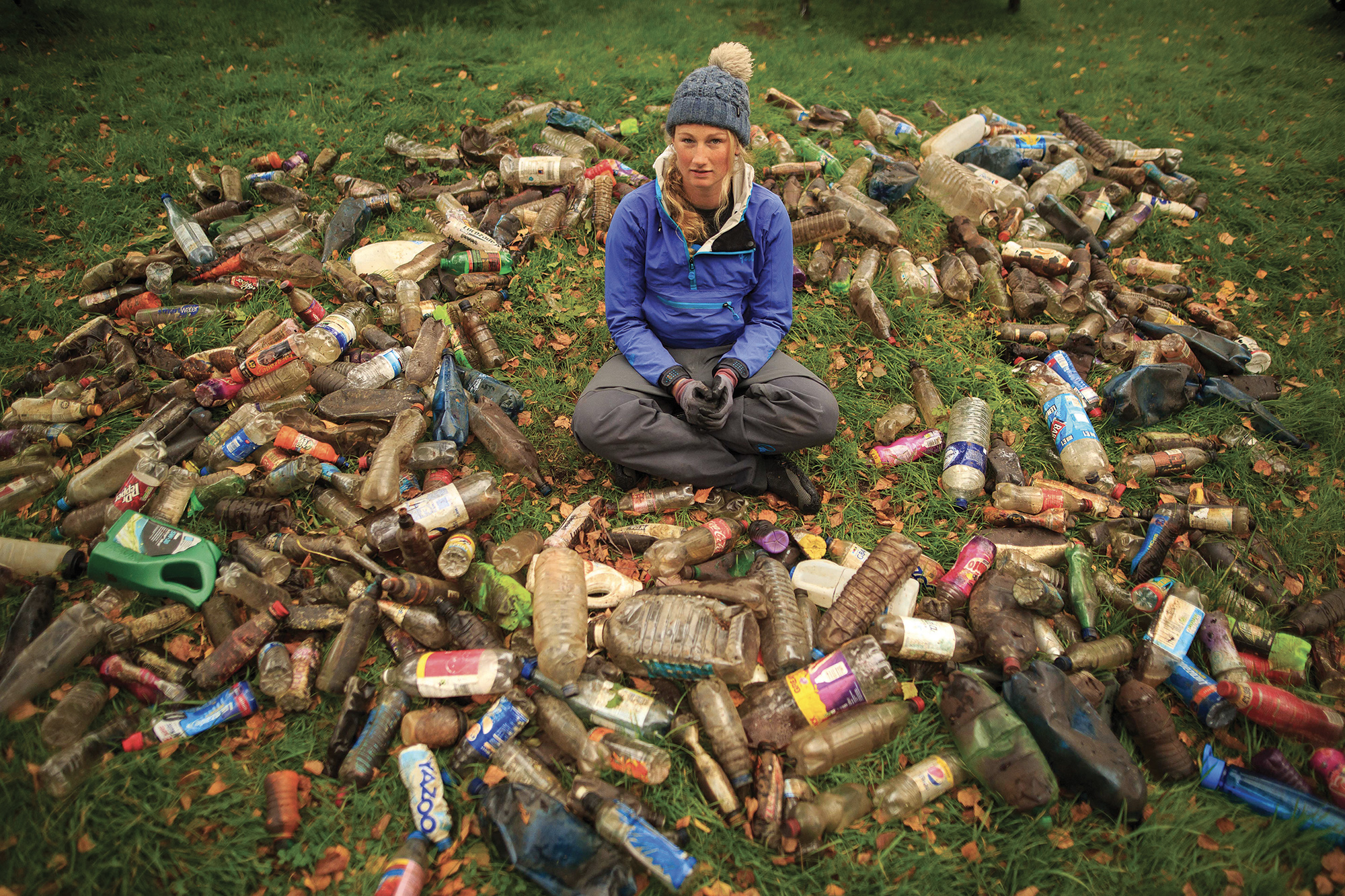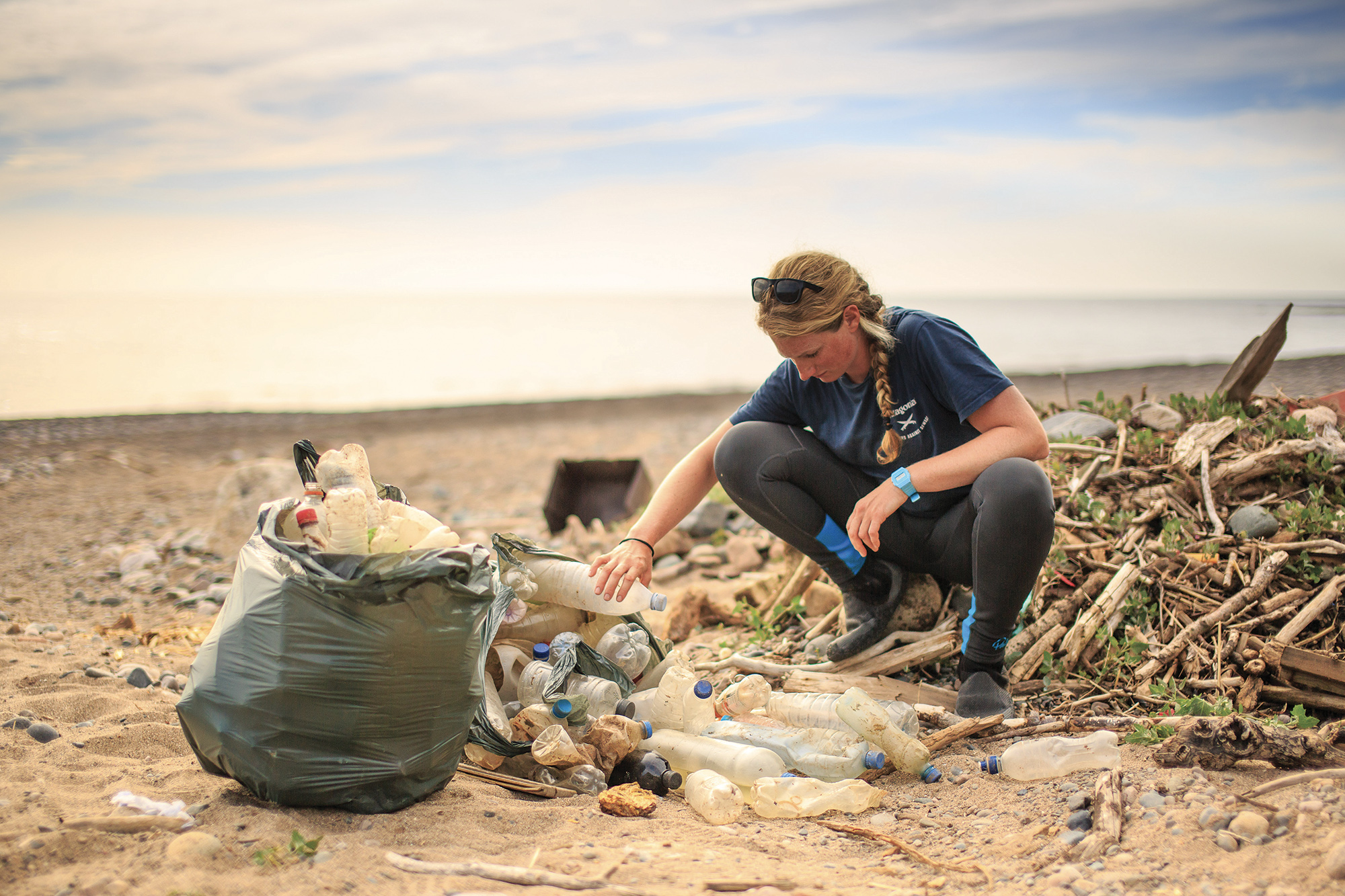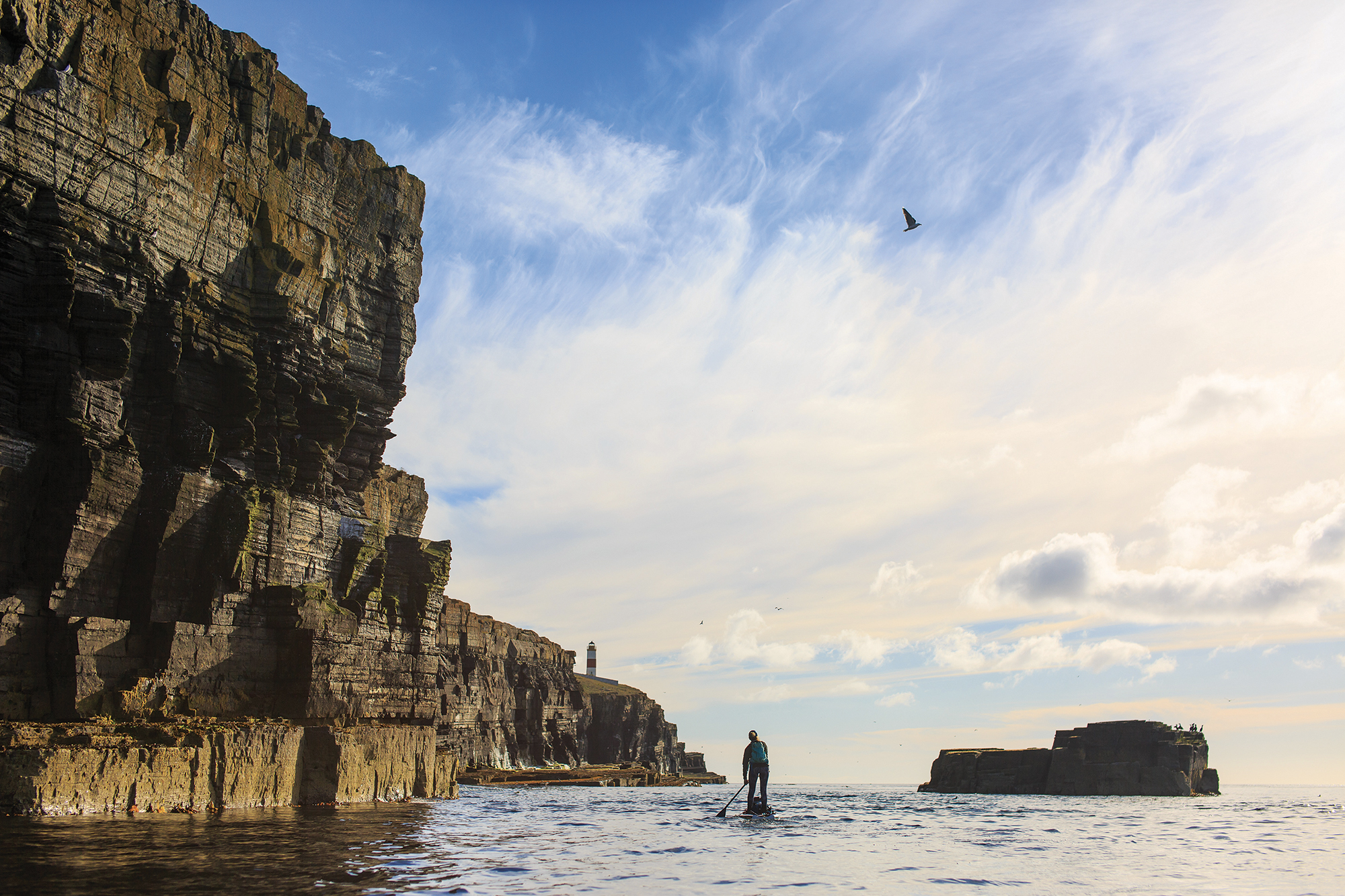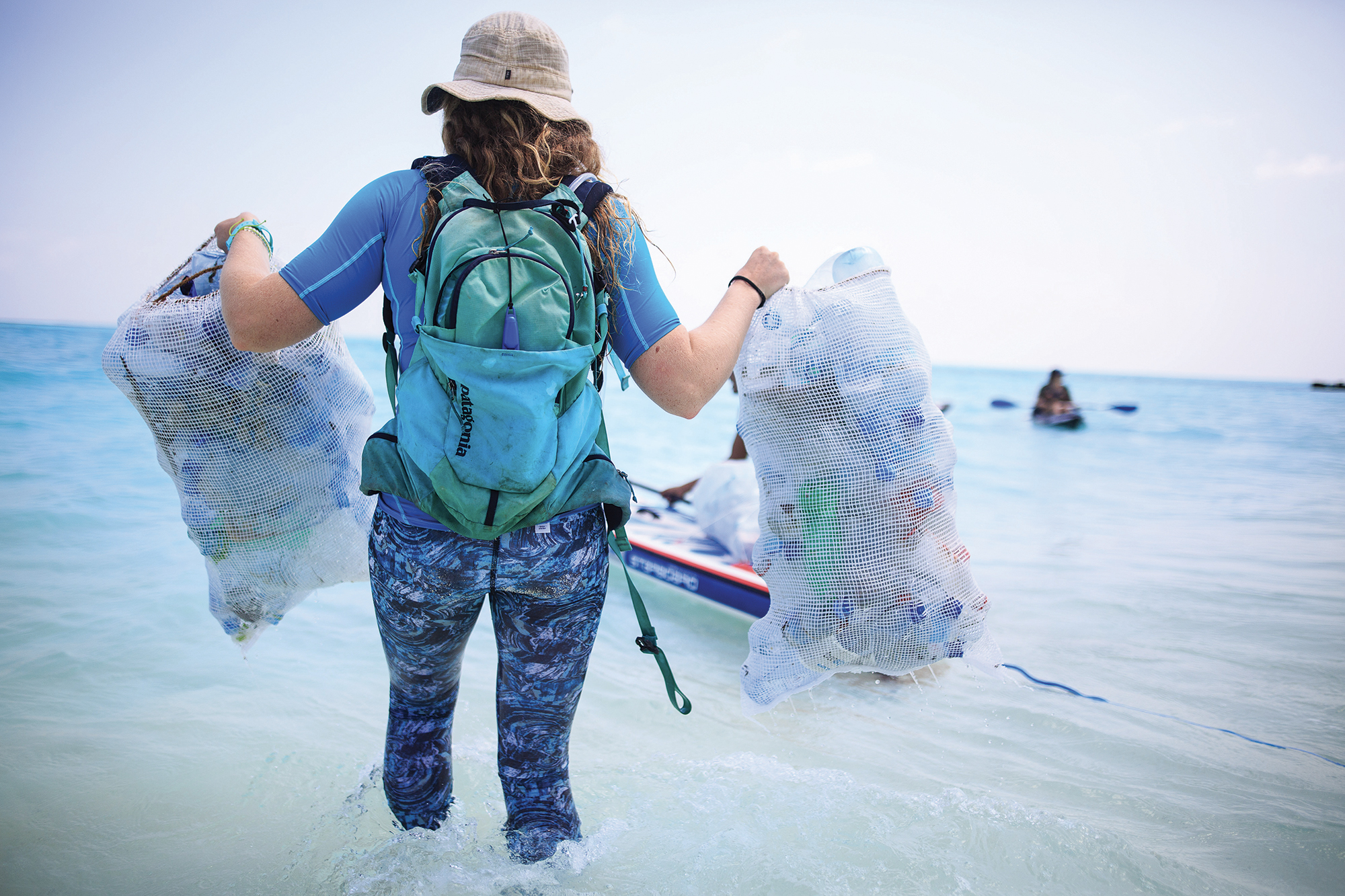Photos James Appleton

Cal Major
After only a few minutes of conversation with Cal, I felt great admiration. Because of her love for the ocean, she is trying hard to move people awareness about the problem of pollution and plastics and to make everyone understand that if we join and act together, a change is not a utopia.

Tell us something about you.
Hi! I’m a veterinarian, a surfer and an ocean advocate. I grew up on the North-West side of the UK, I attended Edinburgh University and now I live in Devon, South-West, just above the sea. The ocean has been my passion and my life for a very long time, after I fell in love with the submarine world while I was scuba diving in the Great Barrier Reef when I was eighteen.
You’re known as an eco-warrior, tell us about your Paddle Against Plastic project.
I created it following the need to share a positive message about plastic pollution. I’ve always seen so much pollution on the beaches that I love after every surf session or every walk on the seashore. I felt bad hearing stories of animals trapped in plastic, or starving to death after they ingested it. I did my first expedition alone on a stand up paddle, along the Cornwall coastline, to focus on the plastic problem in those places and also to inspire people to find solution they could be proud of. I tried to encourage people to use more rechargeable water bottles instead of those made in plastic that take 450 years to decompose.
And what about your epic journey along the Cornwall coast?
It took me 1000 miles and 59 days, from Land’s End to John O’Groats, all along the coastline.
I finally took up the challenge in 2018, after thinking about it for a long time. Paddling 1000 miles all along the UK. This was already been done with a lot of different means of transportation, but never on a sup! Once again I wanted to help people to take part in finding a solution about plastic pollution, but especially with this expedition I tried to highlight all the amazing actions that take place all around the UK thanks to communities, companies and individuals who want to solve the problem. I used my expedition as a way to inspire further changes. Just before my departure I’ve also organized a fundraising for two charity associations for mental health- Vetlife and The Samaritans – to honour a dear friend of mine that has lost his battle against depression.
I was hoping to instils in people the idea that spending time in the outdoors can be very good for our mental health and that finding a connection with nature can inspire us to protect it. This expedition was the hardest I’ve ever done, I was paddling from 8 to 12 hours a day, covering an average of 30 miles per day. The longest day was I had was when I paddled 16 hours and traveled for 64 miles. It was both a physical and a psychological challenge. After my previous expeditions at the sea I have developed a greatest respect for the ocean and mother nature’s power, and I’ve been very cautious with winds and tides. On a sup you’re very vulnerable to the weather conditions and I spent a lot of time battling with the sea, alone. I’ve also loved the time spent on the ocean, that’s the place where I heal myself and feel alive, a place so full of wonders, peace and wildlife. I was in my element. I paddled along with dolphins and whales, booby were diving around me and I was surrounded by puffins. I’ve been dazzled by the fact that we need a deep connection with nature to find the instinct to protect it, that’s why there are so many sea communities that put their efforts together to avoid plastic on their beloved beaches.

You’ve also circumnavigated the Isle of Skye alone on sup.
In 2017 I circumnavigated the Isle of Skye, off the west coast of Scotland. I was completely alone for 12 days and I learned how important the connection with nature was to my body and mind.
I enjoyed immersing myself in that environment and paying attention to everything, seeing things I I’ve never noticed before. I found a lot of plastic on those remote beaches that are not very accessible by land. On a beach I came across a beautiful cow, chewing on a fishing net. She had swallowed a part of it, and was standing in front of me for 30 minutes with a net hanging from her mouth, salivating a lot. I was not able to get close enough to help her and as a vet I felt very bad to see an animal in danger without being able to help. Eventually she was able to regurgitate the net but there was the rest of his herd and a flock of sheep near that beach full of garbage and suddenly I was aware on how much plastic we have around, and its power to destroy life.
You’ve been to Maldives following Olive Ridley’s project, what can you say about this experience?
This year I was really lucky to spend almost a month in the Maldives. The first week I was aboard a research vessel with scientists and veterinarians from the Olive Ridley project, who monitor coral reefs for tarot populations. In the Maldives, even if the common method used for fishing are the angle or a pole, finding turtles in fishing nets is a very common event.
The Olive Ridley Project is a wonderful charitable organization created to fight this problem, through physical rescue and the rehabilitation of tangled turtles that have often suffered mortal wounds, removal of nets, and through education and awareness. I was there also to lead a 100 kilometres expedition around Baa atoll on a sup with three amazing women as my teammates: a British and two Maldivians. We had beach cleanups with local communities, talked to schools and resorts highlighting what positive actions were taken to inspire further changes within the country.
We found turtles caught in plastic, saw their fins removed because of the great damage, we saw microplastics floating on feeder canal for stingrays, reefs bleached by the overheating sea, the ocean’s acidification and plastic bottles filling harbours and beaches on the nearer islands. It was so difficult to stay positive.
On the other hand we also visited islands that were doing their best to fight this problem, we had some brilliant and promising conversations with the Environment Minister whose plan is to make Maldives carbon neutral and free from plastic bottles in the near future. The country is well aware of its vulnerability to human actions, it’s the lowest country above sea level (2,5m), and it will be the first to suffer in case of sea level rise. They’re doing all they can to minimize the impact on our planet. But we need a global action to save this country, its amazing wildlife and the damaged ecosystem. Fishing nets come from far away from Sri Lanka and India and carbon emissions around the world are causing acidification and ocean warming that is killing coral reefs. We must all take action before it is too late.

What should we do to be more responsible towards the oceans?
First of all we should understand how much the oceans are important in our lives.
Not only surfers and people who spend time in the oceans benefit from them; oceans produce more than half of the oxygen we breath. Ecosystem and life itself require protection not only because they’re beautiful or fascinating to see, but because they make life on earth possible.
I think that as a human race we are increasingly detached from the natural world.
Taking back this connection is fundamental to us, wether with the oceans, the mountains, a river or a canal near our home, it’s the first step to understand how this is crucial for the health of our body and mind, and to cultivate the willing to protect it.
What should we avoid?
Start taking note of the disposable plastic we use in everyday life and reduce it where possible. Use a reusable water bottle and drink tap water as much as possible. We’ve got to try and see where it takes.
Have you planned new adventures to spread your message?
Sure! This month I’ll go paddling on river Tay, Scotland’s longest river, from it spring to the sea. Further this year I’ll go on a tour in the UK with my movie about the Land’s End to John O’Groats expedition, and I’ll retrace my steps but this time on a mountain bike.
Taking back this connection is fundamental to us, wether with the oceans, the mountains, a river or a canal near our home, it’s the first step to understand how this is crucial for the health of our body and mind, and to cultivate the willing to protect it.
Share this Feature